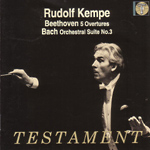Rudolf Kempe leads rather pedestrian accounts of these Beethoven overtures, which is surprising considering his conductorial wizardry in the music of Richard Strauss. The flair for the dramatic he displays in that composer is only partially evident in Beethoven, making for a Fidelio that doesn’t stir the blood and a Leonore that never really catches fire. (Case in point: those rapid string cascades in the coda create little of the thrill found in Szell’s gripping reading.) Egmont also goes along in a business-as-usual manner despite lucid playing from the Berlin Philharmonic. Although it’s never dull, it fails to enthrall in the manner displayed by Szell/Cleveland or Bernstein/Vienna. Coriolan provides the sole exception, as Kempe offers a weighty yet taut rendition that generates real excitement (would that the rest were as engaging!).
The 1959 recordings are well balanced, conveying a sense of depth and space, but the sound lacks clarity and brilliance. However, it’s far superior to the opaque mono sound on the 1956 Bach recording, which finds Kempe leading a heavy big-band conception of the Orchestral Suite No. 3. This is one case where the “modern” light and lean Bach style remains easily preferable.
































